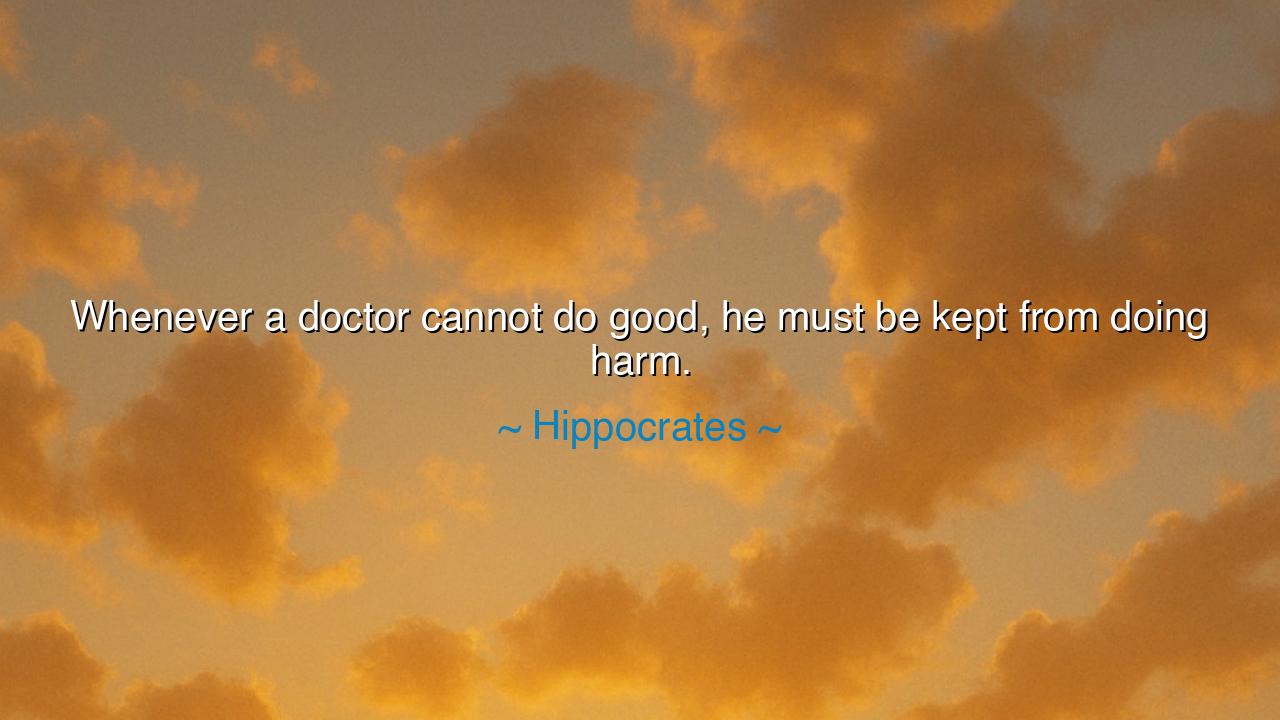
Whenever a doctor cannot do good, he must be kept from doing






Hear, O children of wisdom, the words of Hippocrates, the father of medicine, who declared: “Whenever a doctor cannot do good, he must be kept from doing harm.” In this teaching lies the sacred foundation of the healer’s art. For the physician is entrusted with the most precious gift—the life of another—and in that trust, he is bound by a law higher than knowledge: the law of non-harm. To heal is the highest calling, but when healing is beyond reach, the duty shifts from action to restraint.
The origin of these words is found in the oath of Hippocrates, the solemn covenant sworn by physicians for centuries. In an age when medicine was not yet bound by science but often mingled with superstition, Hippocrates sought to separate the true healer from the reckless experimenter. He knew that there would be times when the doctor’s hand could not bring health. Yet in such moments, the physician was not free to act without care, nor to grasp blindly at remedies that might worsen the suffering. Thus he proclaimed: if no good can be done, at least guard against evil.
Consider, O listener, the tale of medieval Europe, when plague swept across cities and towns. Physicians, desperate to save their patients, turned to bleeding, to poisons, to strange potions, which often brought more death than relief. In their zeal to do something, they forgot Hippocrates’ wisdom: that restraint is also a form of compassion. The plague was beyond their art, but had they chosen not to harm, they might have spared many from needless suffering. Their failure is a reminder that restraint is as noble a medicine as action.
This principle also reaches beyond medicine. In the realm of leadership, when rulers cannot bring prosperity, they must at least avoid inflicting suffering. In the realm of friendship, when one cannot offer a solution, one must avoid careless words that deepen the wound. Hippocrates’ wisdom becomes a universal law: if we cannot help, then let us at least not harm. To forget this truth is to turn our power into a weapon rather than a blessing.
We see also the opposite truth in history’s great healers. Florence Nightingale, in the filth-ridden hospitals of war, understood that when medicine failed, cleanliness and compassion still mattered. She removed the sources of harm—the dirt, the neglect, the despair—and in so doing saved more lives than any potion. She obeyed Hippocrates without knowing his words: when no cure was at hand, she at least made certain that no further harm was added.
O children of tomorrow, let this teaching burn like fire in your hearts: power is dangerous when it is not guided by humility. The doctor, the leader, the teacher, the parent—each holds power over another’s life in some measure. When you cannot do good, when wisdom or strength fails you, remember that you still hold the power to refrain from harm. In that restraint lies honor, dignity, and the preservation of trust.
Practically, this means living with vigilance and humility. If you are entrusted with another’s care, act boldly when you can heal, but step back when your hand may wound. Do not chase glory by reckless action; do not seek praise at the cost of another’s pain. And in your daily life, when faced with the suffering of others, know that sometimes silence, patience, or simply doing no harm is the highest form of kindness.
Thus Hippocrates’ words endure as a foundation stone of all ethics: “Whenever a doctor cannot do good, he must be kept from doing harm.” Let this truth guide every healer, every leader, every soul who carries power. To do good is noble; to avoid harm is sacred. In this balance lies the path of wisdom, the protection of life, and the true art of humanity.






AAdministratorAdministrator
Welcome, honored guests. Please leave a comment, we will respond soon